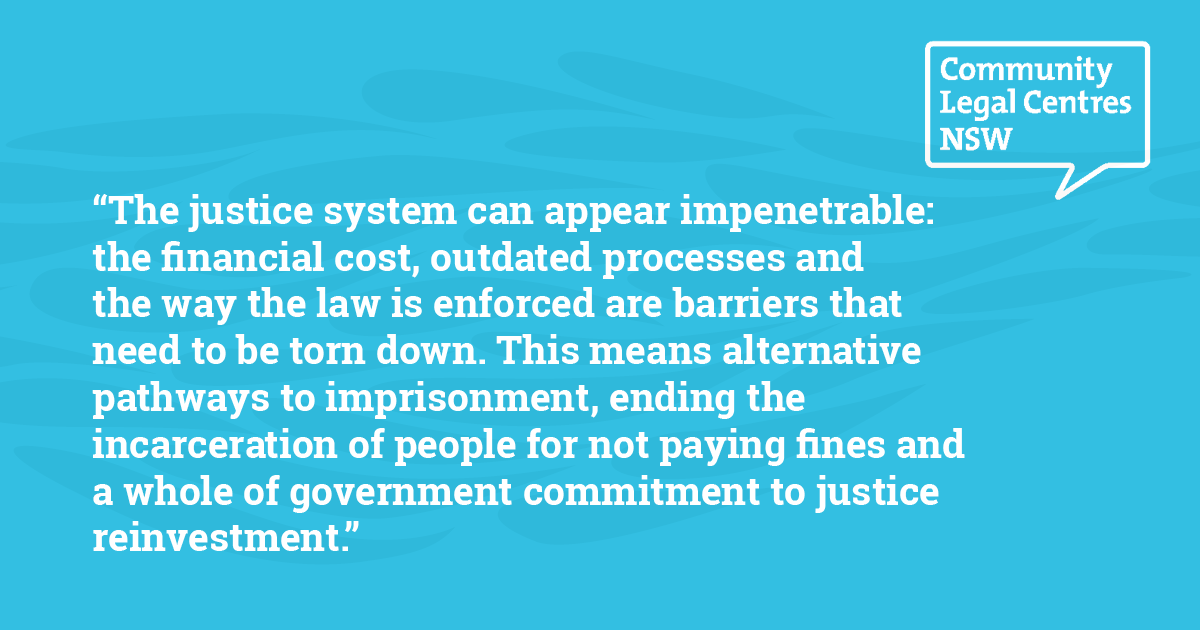
Media Release: 28 March 2018
The Aboriginal Legal Service (NSW/ACT), The Law Society of NSW, Community Legal Centres NSW and Kingsford Legal Centre have united to call upon the Australian and NSW Governments to recognise and address the shameful incarceration rates of Aboriginal and Torres Strait Islander people.
We welcome the report and recommendations of the Australian Law Reform Commission’s inquiry into Incarceration Rates of Aboriginal and Torres Strait Islander Peoples and urge swift and coordinated governmental action to implement the ALRC’s recommendations.
We support the adoption of justice-specific Closing the Gap targets in addition to existing education, employment and health targets to provide a holistic approach to reducing prison numbers and recidivism.
Justice targets must be supported by significant legislative reform including to sentencing and bail laws.
Priority should be given to reviewing or removing mandatory sentencing, which disproportionately affects Aboriginal and Torres Strait Islander people and increasing diversionary options and community-based alternatives to incarceration such as intensive correction orders.
The use of work and development orders in lieu of payment of fines should be expanded and laws providing for imprisonment for fine default should be repealed.
The Australian and NSW Governments must, as a matter of urgency, work with Aboriginal and Torres Strait Islander organisations and communities to identify service gaps and barriers to access to justice.
This should include adequate funding for culturally appropriate legal assistance and interpreter services. We also support the recommendation for a national inquiry into child protection laws and processes affecting Aboriginal and Torres Strait Islander children.
Aboriginal Legal Service (NSW/ACT) Chief Executive Officer Lesley Turner:
“The imprisonment rate of Aboriginal and Torres Strait Islander people has worsened since the final report of the Royal Commission into Aboriginal Deaths in Custody in 1991 to reach a crisis point,” Mr Turner said.
“The cycle of incarceration will continue devastating families and communities if we do not remodel our approach to criminal justice. Closing the Gap requires an integrated response to crime, health and social services to reduce socio-economic disadvantage and the underlying causes of offending.
“This includes implementing more culturally-appropriate early intervention and prevention programs that address the complex legal and non-legal issues faced by Aboriginal and Torres Strait Islander people including housing, disability, mental health, drug and alcohol rehabilitation and family violence.”
The Law Society of NSW President Doug Humphreys:
“Our current punitive approach to justice is leading to the incarceration of more Aboriginal and Torres Strait Islander women than ever before, resulting in the destruction of families and communities and more children not only ending up in out-of-home care but following down a path of crime,” Mr Humphreys said.
“Setting justice-specific targets and focusing on justice reinvestment means addressing core problems including family violence. Making community-based sentences more readily available, particularly in regional and remote areas and establishing Indigenous sentencing courts, are just two initiatives that could make a big difference to incarceration and re-offending rates.
“This will not only do more to address to the disadvantage and marginalisation Aboriginal and Torres Strait Islander communities face but also makes better long-term financial sense for the overall Australian community who would prefer to devote more resources to hospitals and schools than prison beds.”
Community Legal Centres NSW Chairperson Katrina Ironside:
“Every day community legal centres work with Aboriginal and Torres Strait Islander people who are facing debts, fines or violence. Our work helps people manage these situations at an early stage, so they do not end up in the formal court system, ultimately with the risk of going to gaol,” Ms Ironside said.
“The justice system can appear impenetrable: the financial cost, outdated processes and the way the law is enforced are barriers that need to be torn down. This means alternative pathways to imprisonment, ending the incarceration of people for not paying fines and a whole of government commitment to justice reinvestment.
“After decades of reports, recommendations and calls for reform, it is time for governments to put resources into community-led solutions on the ground.”
Kingsford Legal Centre Director Anna Cody:
“Australia needs to comply with our human rights obligations. The United Nations has said our mandatory sentencing and imprisonment for fine default laws breach human rights and need to be scrapped,” Ms Cody said.
“Locking up Aboriginal and Torres Strait Islander men, women and children at these unprecedented rates fractures the community and is a sign that the justice system is broken. The Australian Law Reform Commission recommendations are a step on the path to recovery.
“State and territory governments need to urgently address the root causes of this imprisonment cycle, while respecting Aboriginal and Torres Strait Islander peoples’ right to self-determination.”
Some key facts about Aboriginal and Torres Strait Islander incarceration:
- Aboriginal and Torres Strait Islander people make up 24 per cent of the total prison population in NSW and 27 per cent of prisoners in Australia.
- This is despite Aboriginal and Torres Strait Islander people represent just 2.8 per cent of the total NSW population and 2.5 per cent of the total Australian population.
- Aboriginal and Torres Strait Islander women are the fastest growing cohort of those imprisoned, accounting for 34 per cent of women imprisoned in Australia.
- Aboriginal and Torres Strait Islander people are the most incarcerated people in the world, by percentage of population (2,346 per 100,000). (Australian Bureau of Statistics)
The Aboriginal Legal Service, The Law Society of NSW and Community Legal Centres NSW all contributed to the Australian Law Reform Commission’s inquiry into Incarceration Rates of Aboriginal and Torres Strait Islander Peoples. Submissions to the Commission can be viewed here.
Media Contacts
Aboriginal Legal Service (NSW/ACT) - Richard Lenarduzzi - 0411 254 390
The Law Society of New South Wales - Marianna Papadakis | Media and Public Relations Manager 0413 440 699 | media@lawsociety.com.au
Community Legal Centres NSW - Mark Riboldi | Advocacy & Communications Manager | 0433 753 376 | mark.riboldi@clcnsw.org.au
Kingsford Legal Centre - Associate Professor Anna Cody | Director | 0431 636 594 | acody@unsw.edu.au
